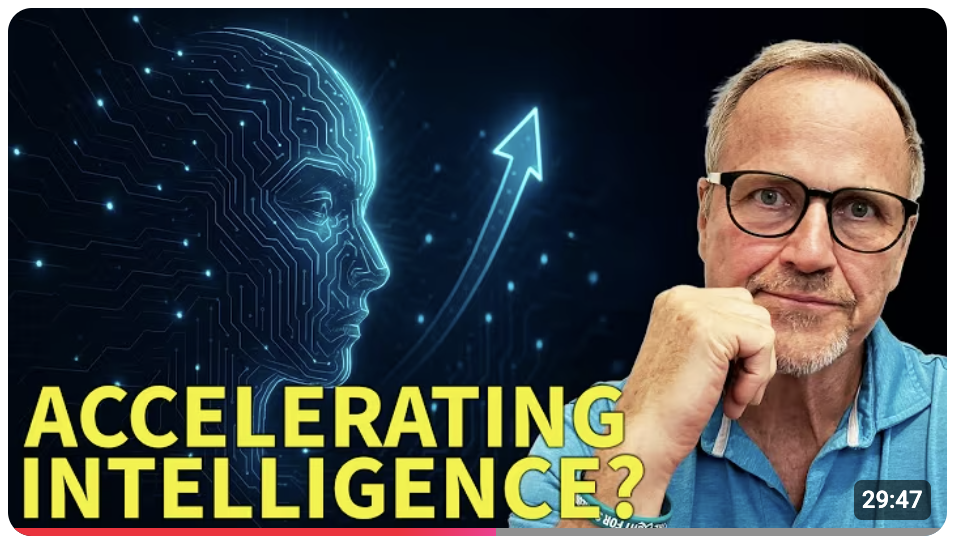Intelligence Explosion
This is a talk I gave to the Lunatick Club (a groups of ten local men, modelled after the group described in the book 'The Lunar Men')
These are the days of lasers in the jungle
Lasers in the jungle somewhere
Staccato signals of constant information
A loose affiliation of millionaires
And billionaires
The Boy in the Bubble. Paul Simon. Graceland (1986)
Artificial General Intelligence
In mid 2025, there are a series of technological developments achieving critical mass, with major accelerations of progress likely. In addition to progress in individual fields, there are also patterns emerging such that progress in one is likely to enhance progress in others, with feedback loops interacting.
It's an exciting/scary time.
An earlier blog of mine Brains and Neural Networks
Robotics and Autonomous Cars
Driving round the Arc de Triomphe
Cybercab; going FSD unsupervised in Austin Texas, June 2025
Quantum Compute
Michio Kaku, professor of theoretical physics at the City College of New York and the CUNY Graduate Center.
Quantum Computers Aren’t What You Think — They’re Cooler | Hartmut Neven
Work
Mike Wooldridge, Professor of AI at Oxford University
Popular Vote
Universal Basic Income (UBI)
A universal basic income is an unconditional, periodic cash payment that a government makes to everyone with no strings attached.
Writers, politicians, and others have endorsed the idea of a minimum guaranteed income.
UBI proponents include reformers (who aim to address problems with the status quo) and futurists (who are more concerned about the threat of technological unemployment or see a basic income as a cornerstone of an eventual utopia).
Questions remain concerning the affordability of a basic income and whether citizens who receive it would continue to work or seek work.
German Basic Income Study Busts “Social Hammock” Myth Apr 16, 2025.
The Pilotprojekt Grundeinkommen gave 107 participants €1,200 monthly for three years with no strings attached.
The most significant finding contradicts the “welfare dependency” argument often used against UBI. “Recipients didn’t withdraw from the labor market or significantly reduce their working hours. This challenges the ‘social hammock’ stereotype that people would stop working if given unconditional money.”
The findings align with other research showing that financial security, social connection, and autonomy are fundamental to mental health and wellbeing, suggesting that basic income could be a valuable tool for building resilience in modern societies.
The Long, Weird History of Universal Basic Income—and Why It’s Back
Who Really Stands to Win from Universal Basic Income?
The Economic Impact of a Universal Basic Income (Critical review)
List of advocates of universal basic income
Europe
- Tim Berners-Lee, World Wide Web inventor
- Rutger Bregman, Dutch author
- Thomas Piketty, economist
- Jeremy Corbyn, British politician
- Yanis Varoufakis, former finance minister of Greece
- Richard Branson, British business magnate
- Geoffrey Hinton, British computer scientist
United States and Canada
- James Baker, former U.S. Treasury Secretary
- Peter Diamond, 2010 Economics Nobel Prize winner
- Jack Dorsey, founder of Twitter
- Robert Reich, former U.S. Secretary of Labor
- George P. Shultz, former U.S. Treasury Secretary
- Andrew Ng, computer scientist, statistician, and artificial intelligence researcher
- Sam Altman, CEO of OpenAI
- Elon Musk, business magnate
- Joe Rogan, American podcast host
- Andrew Yang, American businessman, attorney, lobbyist, and politician. Founder of Venture for America, and a 2020 Democratic presidential candidate
- Mark Zuckerberg, founder of Meta Platforms
- Jeff Bezos, founder of Amazon
- Bill Gates, founder of Microsoft
- Tim Cook, CEO of Apple
- Larry Page, co-founder of Google
- Ray Kurzweil, American inventor and futurist
- Neil deGrasse Tyson, American astrophysicist
- Timothy Leary, candidate for governor of California in 1969
- Eugene McCarthy, candidate for president of the United States in 1968
- Peter Diamandis, Greek-American entrepreneur
- Peter Thiel, German-American entrepreneur
Asia, Africa, Latin America, Oceania
- Richard Di Natale, Australia. An Australian senator from 2011 to 2020 and the leader of the Australian Greens from 2015 to 2020.
- Archbishop Desmond Tutu, 1984 Nobel Peace Prize Laureate, South Africa
- Johann Rupert, South-African billionaire businessman
Historical advocates
Eighteenth and nineteenth centuries
- Thomas Spence, an eighteenth century English radical, was apparently the first to lay out in full what is now called a universal basic income.
- Thomas Paine, a philosopher and one of the Founding Fathers of the United States, advocated a capital grant and an unconditional citizens pension in his 1797 pamphlet Agrarian Justice.
- William Morris, British socialist activist
Twentieth century
- Buckminster Fuller, architect
- Bertrand Russell, philosopher
- American economist John Kenneth Galbraith signed a document with 1,200 other economists in 1968 calling for the 90th U.S. Congress to introduce in that year a system of income guarantees and supplements.
- American economist Milton Friedman advocated a basic income in the form of a negative income tax in his 1962 book Capitalism and Freedom, and again in his 1980 book Free to Choose.
- Austrian economist Friedrich Hayek advocated a guaranteed minimum income in his 1944 book The Road to Serfdom, and reiterated his support in his 1973 book Law, Legislation and Liberty.
- Civil rights leader Martin Luther King, Jr. endorsed it under the name of "the guaranteed income" in his 1967 book Where Do We Go from Here: Chaos or Community? shortly before his assassination.
- U.S. Senator George McGovern from South Dakota sponsored a bill proposed by the National Welfare Rights Organization to enact a $6,500 guaranteed minimum income, and in his 1972 presidential campaign, proposed replacing the personal income tax exemption with a $1,000 tax credit as a minimum-income floor for every citizen.
- Virginia Woolf, English writer
Twenty-first century
- Stephen Hawking, English theoretical physicist, cosmologist, and author
- Pope Francis, late pope of the Catholic Church
















